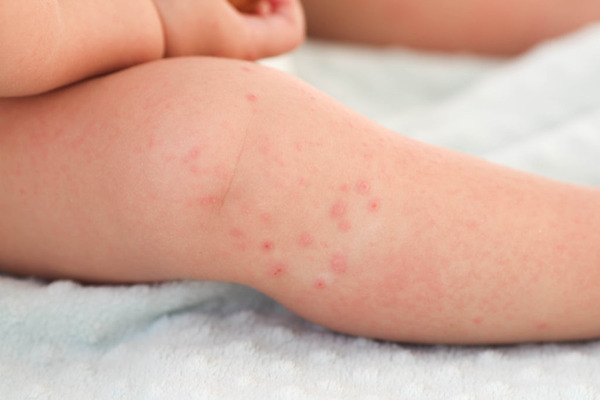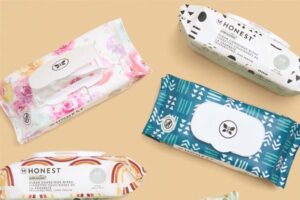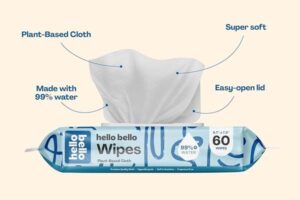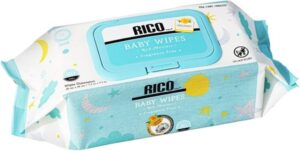
Are you worried about the chemicals touching your baby's sensitive skin when you use a wipe? Reading long ingredient lists can be confusing. Understanding the common, safe chemicals used helps you choose the best wipes.
Baby wipes are mostly made of purified water (often over 90%). They also contain mild cleansing agents (surfactants), preservatives to stop bacteria and mold growth, and sometimes ingredients to moisturize the skin or balance the pH.
These components work together to make baby wipes effective and safe. The water provides moisture for cleaning. Gentle cleansers lift away urine, stool, and dirt without being harsh. Preservatives are crucial to keep the wipes fresh and free from harmful microbes from the first wipe to the last. Some formulations include humectants like glycerin to add moisture back to the skin, preventing dryness. Others use pH buffers, such as citric acid or sodium citrate, to maintain a pH level close to baby skin's natural acidity, which helps protect the skin's barrier. At BBWIPES®, we carefully select each ingredient based on its function and, most importantly, its safety record for delicate baby skin.
Let's break down the typical ingredients further. The largest component is highly purified water, ensuring purity. Next come mild surfactants, like coco-glucoside or decyl glucoside, derived from natural sources like coconut or corn; these gently cleanse without stripping the skin's natural oils. Humectants like glycerin or aloe vera extract help attract and retain moisture on the skin. Preservatives are non-negotiable for safety; commonly used safe options include sodium benzoate or potassium sorbate. We also use pH adjusters like citric acid to ensure the wipe solution is gentle and compatible with the baby's skin pH. We sometimes add skin conditioning agents like Vitamin E or chamomile extract for extra soothing benefits, always ensuring they are hypoallergenic. Our commitment is to transparency and using ingredients that meet strict safety standards, like those set by the FDA and EU Cosmetics Regulations.
Are chemicals in baby wipes safe for newborns?
It's completely understandable to question everything that touches your newborn's incredibly delicate skin. Are the chemicals in baby wipes truly gentle enough from day one? Let's look into it.
Yes, high-quality baby wipes specifically designed for newborns use exceptionally mild, gentle ingredients that undergo rigorous safety testing. Look for labels stating hypoallergenic, dermatologist-tested, fragrance-free, alcohol-free, and pH balanced to ensure maximum safety for sensitive newborn skin.

Newborn skin requires special attention. Here's a deeper look at why certain wipes are safe and what to look for:
Understanding Newborn Skin Sensitivity
A newborn's skin is significantly different from adult skin.
- Thinner Barrier: The outermost layer (stratum corneum) is thinner and less developed, making it more permeable and susceptible to irritation and moisture loss.
- Higher pH: A newborn's skin surface pH is initially higher (more neutral) than older children and adults, making it less effective as a protective barrier against bacteria.
- Developing Microbiome: The natural balance of beneficial bacteria on the skin is still establishing itself.
Because of these factors, newborns are more vulnerable to harsh chemicals, friction, and changes in moisture. Using the wrong type of wipe can easily lead to dryness, redness, or diaper rash. This is why formulations for newborns must be exceptionally gentle.
Key Safety Indicators to Look For
When choosing wipes for a newborn, these terms on the packaging are good indicators of a safe product:
| Safety Indicator | What It Means | Why It's Important for Newborns |
|---|---|---|
| Hypoallergenic | Formulated to minimize the risk of allergic reactions. | Reduces the chance of skin irritation or allergies. |
| Dermatologist-Tested | Tested on human skin under the supervision of a dermatologist. | Provides assurance of skin compatibility. |
| pH Balanced | Formulated to match the natural pH of healthy baby skin (around pH 5.5). | Helps maintain the skin's natural protective barrier. |
| Fragrance-Free | Contains no added fragrances or masking scents. | Fragrances are common allergens and irritants. |
| Alcohol-Free | Does not contain drying alcohols like ethanol or isopropyl alcohol. | Prevents drying out the skin and potential stinging. |
| Paraben-Free | Does not contain paraben preservatives (e.g., methylparaben, propylparaben). | Addresses consumer concerns about potential effects. |
| Phenoxyethanol-Free | Does not contain the preservative phenoxyethanol. | Caters to parents seeking alternatives preservatives. |
At BBWIPES®, we offer formulations that meet these criteria, ensuring the gentlest care for newborns, backed by compliance with standards like FDA 21 CFR and EU Cosmetics Regulation 1223/2009.
The Importance of Regulatory Oversight
Reputable manufacturers adhere to strict regulations.
- In the USA: The Food and Drug Administration (FDA) regulates cosmetics, including baby wipes, under the Federal Food, Drug, and Cosmetic Act. Ingredients must be safe for their intended use.
- In the European Union: The EU Cosmetics Regulation (EC) No 1223/2009 requires cosmetic products to undergo a rigorous safety assessment before being placed on the market. It bans or restricts many potentially harmful ingredients.
We ensure our formulations meet or exceed these global standards, providing peace of mind.
A Note on Patch Testing
Even with the safest products, every baby is unique. If your newborn has exceptionally sensitive skin or known allergies, it's always wise to perform a patch test. Gently wipe a small, clean area of skin (like the inner arm or leg) and wait 24 hours to check for any reaction before using the wipes more broadly.
What ingredients should you avoid in baby wipes?
While most baby wipes from trusted brands are formulated with safety in mind, knowing which ingredients can cause problems helps you make informed choices, especially for babies with sensitive skin.
Generally, you should avoid baby wipes containing drying alcohols (like SD alcohol, ethanol), potentially irritating fragrances, certain preservatives known for allergies (like MIT/CMIT, formaldehyde-releasers), and harsh sulfates (SLS/SLES). Always read the ingredient list.

Let's dive deeper into why these ingredients are best avoided in products meant for delicate baby skin:
Why Avoid Drying Alcohols?
- What they are: Simple alcohols like Ethanol, SD Alcohol (Specially Denatured Alcohol), Isopropyl Alcohol.
- Why avoid: These types of alcohol can strip the skin of its natural oils, leading to dryness and irritation. They can also cause a stinging sensation, especially if the skin is already broken or irritated (like with diaper rash).
- Note: Don't confuse these with 'fatty alcohols' like Cetyl or Stearyl Alcohol, which are non-irritating emollients often used to help soften the skin.
The Fragrance Factor
- What it is: Added scents, listed often as "Fragrance," "Parfum," or specific essential oils.
- Why avoid: Fragrances are among the most common causes of skin allergies and irritation (contact dermatitis). This applies to both synthetic fragrances and some natural essential oils. Terms like "unscented" can sometimes mean a masking fragrance was added to cover chemical smells. "Fragrance-free" is the clearer choice for sensitive skin.
- Our approach: BBWIPES® offers truly fragrance-free options and can develop custom formulations using hypoallergenic, natural scents if desired, always prioritizing safety testing.
Preservative Concerns
Preservatives are necessary, but some have raised concerns:
| Preservative Type | Examples | Why Some Avoid Them |
|---|---|---|
| Formaldehyde Releasers | DMDM Hydantoin, Imidazolidinyl Urea, Diazolidinyl Urea | Can release small amounts of formaldehyde over time, a known allergen and potential irritant for sensitive individuals. |
| Methylisothiazolinone (MIT) / Methylchloroisothiazolinone (CMIT) | Often listed as MIT or MCI/MI | High potential for causing allergic contact dermatitis. Restricted in leave-on products in the EU and Canada. |
| Parabens | Methylparaben, Propylparaben, Butylparaben | Concerns raised about potential endocrine disruption, although regulatory bodies generally consider them safe at low levels. Many brands avoid them due to consumer preference. |
| Phenoxyethanol | Phenoxyethanol | Generally considered safe below 1% concentration, but some studies raised concerns about potential toxicity in infants if ingested (not typically a risk with wipes). Some parents prefer to avoid it. |
- Our commitment: We stay updated on preservative safety research and offer options using widely accepted safe preservatives like sodium benzoate or potassium sorbate, as well as phenoxyethanol-free formulations for clients like Priya Kapoor who might target a market sensitive to this ingredient.
Harsh Surfactants (Cleansers)
- What they are: Sodium Lauryl Sulfate (SLS) and Sodium Laureth Sulfate (SLES).
- Why avoid: These are powerful cleansers that can be too harsh for baby skin, stripping away natural protective oils and causing irritation. They are less common in quality baby wipes today, but still worth checking for.
- Our Alternatives: We use milder, plant-derived surfactants like coco-glucoside and decyl glucoside that clean effectively without irritating.
Making informed choices about ingredients helps ensure the wipes you use are gentle and safe for the baby's delicate skin.
Can I customize the chemical formulation for my brand's baby wipes?
Perhaps you serve a niche market, have specific brand values focused on natural ingredients, or need wipes that meet unique requirements like enhanced moisturization or eco-certification. So, can you customize the chemical formulation?
Yes, absolutely. Partnering with a specialized wet wipe manufacturer like BBWIPES® allows for complete customization of the chemical formulation. You can tailor ingredients to meet specific performance needs, safety profiles, brand philosophies, and target customer preferences.

Customization is at the heart of what we do. It allows brands to differentiate themselves and meet precise customer demands. Here’s how it works and why it’s beneficial:
Tailoring Formulations for Specific Needs
Why settle for off-the-shelf when you can create something unique? Customization possibilities include:
- Ultra-Sensitive Skin: Developing formulations free from common allergens, using minimal ingredients, and focusing on soothing components like oat extract or calendula. This is crucial for clients like US pediatric hospitals.
- Eco-Conscious Brands: Using plant-based, biodegradable ingredients, sourcing certified organic components (like Luca Moretti's olive oil wipes), and ensuring the formula aligns with eco-certifications (e.g., EU Ecolabel).
- Value-Added Benefits: Incorporating specific ingredients for added functionality, such as extra moisturizers (like argan oil for the French hotel chain), calming botanicals (lavender or chamomile), or even specialized ingredients like CBD for wellness brands (addressing Priya Kapoor's needs).
- Meeting Regional Preferences/Regulations: Adjusting formulas based on local ingredient trends, preferences (e.g., specific natural extracts popular in a region), or complex regulatory requirements (like handling CBD regulations or different preservative rules globally).
The BBWIPES® Customization Process
We make customization straightforward and collaborative:
- Consultation & Brief: We start by understanding your vision, target market (like Emily Thompson's data-driven needs or Henrik Sørensen's sustainability focus), desired product features, performance requirements, and budget.
- Formulation R&D: Our experienced chemists leverage our extensive ingredient library and R&D capabilities (including our AquaRise® technology) to develop bespoke formulations. We consider ingredient synergy, stability, and preservation efficacy.
- Prototyping & Testing: We create sample batches for your evaluation. We conduct rigorous in-house testing (pH, stability, microbial challenge testing) and can facilitate external testing (dermatological, hypoallergenic, biodegradability). We include 3 prototype iterations free of charge.
- Regulatory Compliance Check: Our regulatory experts ensure the final formulation complies with all relevant regulations in your target markets (FDA, EU Cosmetics Regulation, REACH, etc.). We provide necessary documentation like Safety Data Sheets (SDS).
- Scale-Up & Production: Once approved, we move to full-scale manufacturing in our ISO 9001, GMP, and ISO 22716-certified facility, maintaining strict quality control throughout.
Synergy Between Liquid and Substrate
The wipe material itself plays a role. We help you choose the best substrate (e.g., 100% organic cotton, bamboo viscose, PLA non-woven) to complement your custom liquid formulation, ensuring optimal liquid release, softness, and strength, while meeting sustainability goals if needed.
Navigating the Complexities
Custom formulations, especially those with novel ingredients or destined for global markets, require navigating complex regulations. Our team has the expertise (Regulatory Mastery) to guide you through ingredient restrictions, labeling requirements, and certification processes, ensuring a smooth path to market.
Partner with BBWIPES® for Your Custom Baby Wipe Needs
Choosing the right manufacturing partner is crucial for creating baby wipes that are safe, effective, and align perfectly with your brand. At BBWIPES®, we combine over 12 years of specialized experience with cutting-edge technology and a commitment to quality.
We understand the nuances of baby wipe formulation, from ensuring the utmost safety for newborns to developing innovative solutions for niche markets. Our Custom Formulation Expertise means we work closely with you, leveraging our R&D labs and chemists to translate your vision into a high-performance product. Whether you need hypoallergenic, organic, biodegradable, or feature-specific wipes, we have the capability.
Our Quality Assurance is uncompromising. Operating from our ISO 9001, GMP, and ISO 22716-certified facility, we implement a rigorous 4-Stage Inspection Protocol, from raw material screening to final packaging integrity testing. We meet stringent global standards (FDA, EU Ecolabel, REACH) and hold certifications like Cruelty-Free Leaping Bunny.
We champion Eco-Conscious Innovation with options like 100% organic cotton or bamboo substrates and our unique AquaRise® technology, which reduces liquid usage without sacrificing efficacy. Our vertical integration ensures control over quality and customization, while our Agile Global Logistics guarantees reliable delivery worldwide. We have proven success stories, like developing pH-balanced wipes for US hospitals and bespoke luxury wipes for French hotels.
Ready to create exceptional baby wipes tailored to your brand?
Contact Timothy Wei, our Global Business Director:
Email: Timothy@bbwipes.com
Phone/WhatsApp: +86 13750830177
Visit our website www.bbwipes.com for live chat support. Ask for our brochure and a complimentary sample kit today!
Conclusion
Baby wipes primarily contain water, gentle cleansers, essential preservatives, and sometimes moisturizers. While most are safe, avoid harsh ingredients like alcohol and certain allergens. Partnering with an expert manufacturer like BBWIPES® allows customization for optimal safety, performance, and brand alignment.







